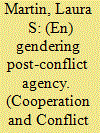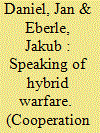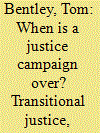|
|
|
Sort Order |
|
|
|
Items / Page
|
|
|
|
|
|
|
| Srl | Item |
| 1 |
ID:
182618


|
|
|
|
|
| Summary/Abstract |
This article explores how female agency and experience manifest in a local Sierra Leonean peacebuilding program known as Fambul Tok. While post-conflict literature, namely transitional justice and peacebuilding, has become more critical in recent years, there is still a tendency to generalize both the ‘local’ and ‘women’. There is, however, much greater scope to delineate how local programs shape and are shaped by women in these settings. While Fambul Tok was, at least theoretically, meant to better align with the needs and priorities of Sierra Leoneans, including women, the empirics suggest that female engagement ultimately results in a wide range of outcomes, which are not necessarily more ‘empowering’, ‘transformative’ or ‘good’ than international programs. Drawing on original empirical data from Fambul Tok, this article highlights the complexity of gendered power relations within these programs and how individual women have multiple, diverse and contested forms of agency and experiences within local settings.
|
|
|
|
|
|
|
|
|
|
|
|
|
|
|
|
| 2 |
ID:
182619


|
|
|
|
|
| Summary/Abstract |
A theoretical gap in the audience cost theory is the missing analysis of its central feature: the audience. This article defines the audience as a group composed of individuals and societal actors that can punish a government and pay attention to the issue being negotiated. Thus, the audience can vary depending on the issue salience. When the issue salience is low, the audience comprises just interest groups and the attentive public. Yet, the higher the issue salience, the more voters of the general public also become part of the audience. The audience’s composition in turn determines the level of the audience costs. Because the general public tends to evaluate national honor more highly, be less informed and have less well-defined preferences than interest groups and the attentive public, the audience costs should be higher when the issue salience is high. Furthermore, the audience can take actions that prevent the effect of audience costs or generate exogenous audience costs.
|
|
|
|
|
|
|
|
|
|
|
|
|
|
|
|
| 3 |
ID:
182616


|
|
|
|
|
| Summary/Abstract |
The professionalization of transitional justice (TJ) has received extensive academic attention in TJ and related international relations and peacebuilding scholarship. This article adds an element that has received hardly any attention: namely the presence of activism even among professional and usually donor-funded TJ work. I argue that noticing activism in professional contexts requires attention to the ‘everyday’, meaning to life in between, aside and beyond high politics and officially important actors, actions, processes and events. Based on field research in Sierra Leone and Kenya, I describe and discuss everyday examples of a specific form of activism, namely tacit activism that I encountered with three key interlocutors, one Sierra Leonean and two Kenyan nationals involved in professional donor-funded TJ work. Their activism was ’tacit’ in the sense that it was not part of their official project activities and my interlocutors did not advertise their extra plans and efforts to (prospective) donors. And yet, it was precisely through these tacit plans and efforts that they hoped to meet at least some of the expectations that had been raised in the context of professional TJ projects.
|
|
|
|
|
|
|
|
|
|
|
|
|
|
|
|
| 4 |
ID:
182617


|
|
|
|
|
| Summary/Abstract |
What do we speak of when we speak of ‘hybrid warfare’, a notion that has become prominent in discussions of European security? The article shows that this question is difficult to answer, as the hybrid warfare discourse is not only vague, but also consists of multiple, and at times contradictory, narratives. While talking and writing about supposedly the same thing, participants in the hybrid warfare debate often suggest markedly different ideas about the precise nature and target of the threat, offer different responses and draw upon different expertise. Grounding our argument in critical scholarship on narratives, security knowledge and hybrid warfare, we build a framework for studying security narratives around the four elements of threat, threatened value, response and underlying knowledge. This framework is utilised in a case study of Czechia, a country that has played a pioneering and outsized role in European hybrid warfare debates. We identify three narratives of hybrid warfare – defence, counterinfluence and education – which present markedly different understandings of ‘hybrid warfare’, and ways to defend against it. Our intervention hopes to contribute to disentangling the contradictions of the hybrid warfare discourse, itself a necessary precondition for both sound state policy and an informed public debate.
|
|
|
|
|
|
|
|
|
|
|
|
|
|
|
|
| 5 |
ID:
182614


|
|
|
|
|
| Summary/Abstract |
The European refugee crisis has been communicated visually through images such as those of Alan Kurdi lying dead on the beach, by body bags on the harbor front of Lampedusa, by people walking through Europe and by border guards and fences. This article examines the broader visual environment within which EU policy-making took place from October 2013 to October 2015. It identifies ‘tragedy’ as the key term used by the EU to explain its actions and decisions and points out that discourses of humanitarianism and border control were both in place. The article provides a theoretical account of how humanitarianism and border control might be visualized by news photography. Adopting a multi-method design and analyzing a dataset of more than 1000 photos, the article presents a visual discourse analysis of five generic iconic motifs and a quantitative visual content analysis of shifts and continuity across four moments in time. The article connects these visual analyses to the policies and discourses of the EU holding that the ambiguity of the EU’s discourse was mirrored by the wider visual environment.
|
|
|
|
|
|
|
|
|
|
|
|
|
|
|
|
| 6 |
ID:
182615


|
|
|
|
|
| Summary/Abstract |
This article explores the political, strategic and emotional issue of victim groups deciding to continue or discontinue central components of a justice campaign in the aftermath of receiving ‘truth’. Drawing on in-depth interviews, the article focuses on relatives and other stakeholders’ varying positions on (dis)continuing the annual Bloody Sunday commemoration march after the publication of the Report of the Bloody Sunday Inquiry and the UK Prime Minister’s apology for the massacre. I demonstrate that there has emerged an, at times, acrimonious schism between those who feel the apology and report were sufficient to stop the march and those who believe them to be insufficient. Thus, while much of the literature on political apology evaluates its effects on the dyadic relationship between victim and perpetrator, this article develops Sara Ahmed’s concept of ‘overing’ to demonstrate that the ostensible moment of truth can create unanticipated and deleterious intra-victim tensions. The article concludes by suggesting practical measures emerging from the findings that other justice campaigns may consider.
|
|
|
|
|
|
|
|
|
|
|
|
|
|
|
|
|
|
|
|
|